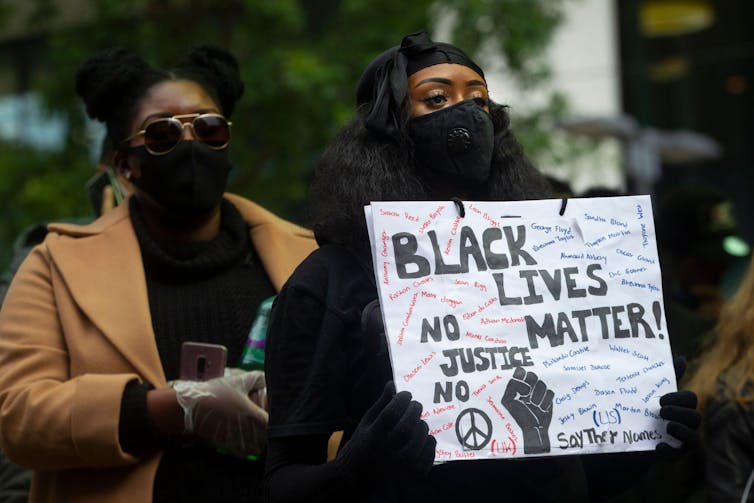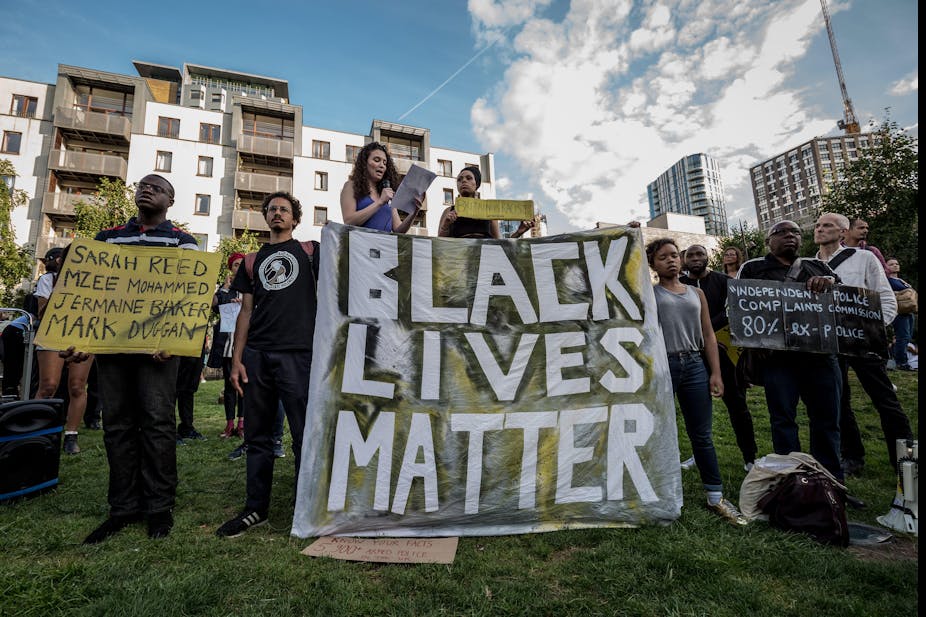Since the sweeping international protests at the murder of George Floyd, the Black Lives Matter movement in the UK has received a considerable amount of attention and support.
Protests in Nottingham in June 2020 saw an estimated 3,000 people stand in socially distanced solidarity, according to what I was told by the organisers. Other protests across the UK, including in Birmingham, Liverpool and Hull, demonstrated similar unease with anti-Black racism, sparking debates in the media and society about the UK’s shortcomings in terms of tackling racism against Black people.
Numerous companies quickly released equality and diversity statements. Some, such as YouTube and L'Oréal, were criticised for lacking real empathy. Others, like Ben & Jerry’s and Nike, were bold in their support of the movement. The much debated Blackout Tuesday protest – initially aimed at addressing racial inequality in music – also gained traction across the UK, albeit some argued that it was too small a gesture to create meaningful change.
By the end of 2020, what had started out as an expression of the injustice experienced by Black people around the world had morphed into a mass movement. As we shall see, however, the movement hasn’t always enjoyed the level of compassion and concord it’s experiencing today.
Beginnings of Black Lives Matter UK
The original Black Lives Matter movement was founded in the US in 2013 by three Black women - Patrisse Cullors, Alicia Garza and Opal Tometi - in response to the acquittal of George Zimmerman for the killing of Black teenager Trayvon Martin in Florida in 2012. By 2015, the first Black Lives Matter chapter in Europe was set up in Nottingham.
In 2016, Black Lives Matter UK led a “national shutdown”, in which activists in Birmingham, Manchester, London and Nottingham blocked roads, the Nottingham tram system and London City airport for several hours to raise awareness about how racism and climate change are interconnected. The protest also marked the fifth anniversary of the police shooting of Mark Duggan, as well as highlighting deaths of Black people in police custody.
Read more: Mark Duggan lawful killing verdict leaves questions over police use of lethal force
One Black Lives Matter protester said the intention was to “put Black issues back onto the political agenda”. Others used the opportunity to highlight a “racist climate crisis”. But while the shutdown received media and public attention, some outlets were unsympathetic about the cause and attempted to decry the integrity and validity of the demonstrations. To many, the shutdown was considered irrational, and they argued there was no real requirement for protests in the UK.
In America, NBC reported that the UK Black Lives Matter movement didn’t receive the same level of support from the public as in the US. The BBC also suggested that the Black Lives Matter marches were met with “some confusion”, with racism apparently perceived by some as a uniquely American problem.
Rather than acknowledge the inequality that Black people in the UK face, the movement attracted annoyance and frustration, with activists seen as unnecessarily disruptive, or too focused on environmentalism. It was a huge contrast to current widespread sentiments that the movement is justified.
Understanding the shift
In the hush created by the pandemic, there appeared to be sufficient quiet for the injustice of George Floyd’s killing to reverberate unimpeded around the world. Black women in cities across the UK began to mobilise the public, with the likes of activists Kerry Nugent and Liza Bilal organising 2020 Black Lives Matter marches in Liverpool and Bristol respectively. The women-led Next Gen Movement was also behind Nottingham’s Black Lives Matter protests.
It is worth pointing out that this was also after the 2019 youth climate strikes had taken place. This global effort, led by Swedish environmental activist Greta Thunberg, marked a turning point in recognising the dangers of the climate crisis. The protests gained considerable support, eventually giving way to conversations about the media’s focus on white climate activists and the importance of highlighting climate-related racism, an idea Black Lives Matter had received criticism for in 2016.

Suddenly, the once blurred reality of Black people’s experiences had become too blatant to ignore and empathy was offered up in droves, from public figures to political recognition of the movement.
But for Black women, visibility can also be a liability. Female Black Lives Matter activists I’ve spoken to have been threatened by right-wing activists and harassed by the media. Their activism hasn’t always been supported by members of their community either. Some have experienced what one activist described to me as a “power struggle” with some of the movement’s male members.
Indeed, the #SayHerName slogan was created in response to how Black women and girls are disregarded in cases of police brutality. While some Black women continue to be vocal and assert themselves, others manage these hostilities by remaining silent. Author Reni Eddo-Lodge describes this phenomenon in her book Why I’m No Longer Talking To White People About Race. She writes: “There is such stigma attached to speaking up and being a woman, let alone speaking up, being a woman, and being black.”
Measuring progress
A year after the 2020 protests, there are small indications of improvement – more non-white faces on our screens, for example. But a year is still insufficient time to see significant change.
Also, the true measure of progress isn’t a matter of optics. We’ll know we’re getting closer to eradicating racism when issues like racial health inequalities no longer exist; when there’s racial equity in the employment market; when our prisons are no longer disproportionately occupied by people of colour; and when Black people – especially women – are able to speak up about their experiences or opinions without being demonised or ignored.
With continued racial abuse, an increase in reported hate crimes and the Commission on Race and Ethnic Disparities suggesting systemic and institutionalised racism doesn’t exist, however, it’s still difficult to be optimistic about the pace at which those advancements will take place.

